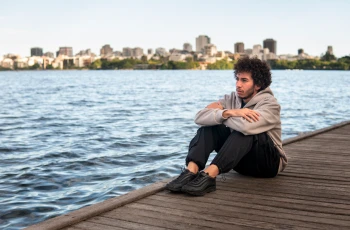What Does Anxiety Feel Like?
Written by Priyanka Agarwal, Writer at Hola Health Medically Reviewed by Amira Shah, MA in Couselling Psychology, Registered Psychotherapist

Contents

In today’s fast-moving world, anxiety has become a common experience for many individuals. Everyone feels anxious at some point in their life. Experiencing occasional anxiety is a natural response and can even have beneficial effects. For instance, feeling anxious before a stage performance, an exam or a job interview makes you alert and focused. But, extreme anxiety can be difficult to manage and affects everyone differently. According to the Australian Bureau of Statistics (ABS),(20-22), 17.2% of Australians aged 16 – 85 years suffer from mental disorders, anxiety being the most common. Wondering what does anxiety feel like? Let’s learn more about it.
What Is Anxiety?
Anxiety is a response to perceived danger or stress, but it’s not always spontaneous. Sometimes, it can be triggered by specific events or situations. It is a feeling of worry, fear and uneasiness usually triggered by demanding situations. Anxiety symptoms can vary widely from person to person, with some experiencing severe anxiety attacks while others may endure a persistent state of tension over minor concerns. Although anxiety is quite a normal part of life, it does affect our overall well-being when it becomes unmanageable.
Anxiety is not the same for everyone. Anxiety symptoms may vary from person to person. Some might experience severe anxiety attacks without prior warning, while others may live in a perpetual state of tension worrying about the minutest of things. Various factors pitch into the development of anxiety. Genetics and family history play a key role. People with a family history of anxiety disorders may be more prone to experience anxiety. Additionally, significant life changes like moving to a new place or going through a breakup can provoke anxiety. Furthermore, character traits like perfectionism can escalate the possibility of developing anxiety.
Anxiety is common and affects millions of people nationwide. Understanding the causes, symptoms and coping mechanisms for anxiety is crucial for improving overall health. While anxiety disorders affect millions of people nationwide, seeking proper guidance and care, such as therapy or medication, can help individuals effectively manage their anxiety.
Is Anxiety Considered a Mental Health Problem?
Anxiety is considered a common mental health problem. It is identified by extreme worry, fearfulness or nervousness about certain situations. It can vary in intensity, from mild to acute and can considerably impact an individual’s day-to-day life. It can be recognised in various forms including generalised anxiety disorder(GAD), panic disorder, obsessive-compulsive disorder (OCD) and specific phobias. Anxiety is a mental health concern and can be managed or treated with therapy, medication, and self-care strategies.
What Does Anxiety Feel Like: Signs and Symptoms
Numerous anxiety symptoms can have an impact on you physically as well as psychologically. It is tough to determine whether anxiety is making you feel or act differently, but being aware of the symptoms can be of huge help. Apart from the primary symptoms of irrational fear and worry, other anxiety signs are mentioned below.
1. Behavioural Symptoms
Anxiety can sometimes lead to changes in the way you behave. These behavioural symptoms include:
- Avoidance of situations where judgment may be perceived.
- Difficulty initiating or maintaining conversations with others.
- Struggles to meet the demands of work, home, or studies.
- Increased consumption of alcohol or other substances.
- Difficulty sleeping.
- Trouble concentrating.
- Difficulty maintaining relationships.
- Neglect of self-care.
- Inability to find enjoyment in leisure activities.
2. Feelings
When you feel anxious, you might experience different emotions that can cause discomfort. These feelings are:
- Feelings of fright and uneasiness
- Feeling tearful
- Constant tension and edginess
- Irritability
- Heightened alertness
- Anger and restlessness
- Nervousness
3. Thoughts
Anxiety can hurt your thought process as well. Some of these thoughts include:
- Negative thinking patterns
- Intrusive thoughts
- Obsessive thinking
- Racing, uncontrollable thoughts
- Increased tendency to overthink.
4. Physical signs
Anxiety can manifest in various physical symptoms. Anxiety can make our bodies react in different ways. The most common ones are listed below:
- Sweating rapidly.
- Heart Palpitations.
- Dry mouth.
- Loss of appetite.
- Weakness and fatigue.
- Difficulty in breathing.
- Trembling or shaking.
- Digestive issues.
- Experiencing headaches.
- Feeling light-headed and dizzy.
- Muscle tension.
- Wanting to urinate frequently.
- Chest pains.
Feeling Anxious Vs Anxiety
Many individuals tend to get confused while trying to differentiate between feeling anxious and anxiety disorders. Let’s understand this better. Feeling anxious is a normal response to any stressful situation. For example, the anxiety you feel before appearing for an examination. On the other hand, anxiety disorders involve irrational worry that can interfere with your daily life. The primary distinction between experiencing regular anxiety and having an anxiety disorder lies in the degree of dysfunction it causes.
Anxiety itself isn’t inherently beneficial; instead, it’s the body’s natural response to stress or danger that can sometimes be useful. Understanding this difference is crucial as it helps individuals recognise and address symptoms early, leading to better management and an improved quality of life. Seeking professional help is key to managing anxiety disorders effectively.
When To Seek Help?
It’s essential to seek help for anxiety when it starts disturbing your daily life and functioning in a big way. If you are constantly worried or anxious and are unable to focus on daily chores, it may be a sign of seeking help. Additionally, if anxiety interferes with sleep, appetite, or enjoyment of activities, it’s essential to consider professional support. If symptoms of depression or suicidal thoughts accompany anxiety, it’s crucial to book an appointment with a mental health professional or counsellor for support. Remember, seeking help for anxiety is a proactive step toward improving overall health. Speak to a doctor online and get quick medical advice, online doctors note, instant scripts or online referrals.
Still wondering what anxiety feels like? Anxiety encompasses overwhelming emotions, physical sensations, and racing thoughts that can leave individuals feeling drained and vulnerable. It’s essential to know that support is available, and with determination and self-care, it is possible to cope with anxiety effectively.
Feeling sick and unsure why? Speak with a GP online in 15 minutes.
See a Doctor now
Available 24/7, across Australia.
Feeling sick and unsure why? Speak with a GP online in 15 minutes.
See a Doctor now
Available 24/7, across Australia.
Reference
- National Study of Mental Health and Wellbeing – Reference Link
What we treat
- Cough
- Nausea & vomiting
- Fever
- Hayfever
- Fatigue
- Sore throat
- Acne
- Hair loss
- Gout
- Eczema
- Rosacea
- Sunburn
- UTI
- Erectile dysfunction
- Contraception
- Morning sickness
- Morning after pill
- Prostate health
- Anxiety
- Depression
- Stress
- Grief & loss
- Antidepressants
- Premature ejaculation
- Asthma
- Blood pressure
- Blood thinners
- Diabetes
- Cholesterol
- Migraines & headaches
- Allergies
- Body ache
- Heartburn & reflux
- Sleep disorder
- Pain relief
- Gastro
Related Articles
What Is Online Therapy? Everything You Need To Know About e-Therapy
February 19, 2026Mental Health
...
Disclaimer
This blog is for general informational purposes only and does not indicate that Hola Health provides all treatments or preventive measures mentioned. It is not intended to be a substitute for professional medical advice. Always seek the guidance of your doctor or other qualified health professional with any questions you may have regarding your health or a medical condition. For emergencies please immediately contact 000. Any medical topics discussed are intended to educate, not to imply availability through Hola Health.
 Facebook
Facebook  X
X  Copy Link
Copy Link



